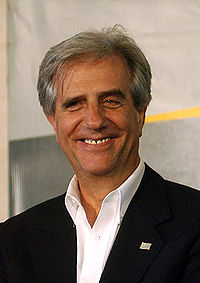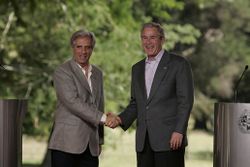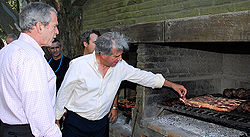Tabaré Vázquez
| Tabaré Vázquez | |
 |
|
|
President of Uruguay
|
|
| In office March 1, 2005 – March 1, 2010 |
|
| Vice President | Rodolfo Nin |
|---|---|
| Preceded by | Jorge Batlle Ibañez |
| Succeeded by | José "Pepe" Mujica |
|
|
|
| Born | January 17, 1940 Montevideo, Uruguay |
| Political party | Broad Front |
| Spouse(s) | María Auxiliadora Delgado |
| Alma mater | Universidad de la República, Uruguay |
| Profession | Oncologist |
| Religion | Roman Catholicism |
| Signature | |
Tabaré Ramón Vázquez Rosas (Spanish pronunciation: [taβaˈɾe raˈmon ˈbaθkeð ˈrosas]; born January 17, 1940) is a former President of Uruguay. A physician (oncologist) by training, he is a member of the leftist Frente Amplo coalition (Broad Front in English). Vázquez was elected president on October 31, 2004, took office on March 1, 2005, and relinquished the office on March 1, 2010.
Contents |
Background
Born in the Montevideo neighbourhood of La Teja, Tabaré Vázquez studied medicine at the Universidad de la República Medical School, graduating as an oncology specialist[1] in 1972. In 1976, he received a grant from the French government, allowing him to obtain additional training at the Gustave Roussy Institute in Paris.
From 1990 to 1995, Vázquez was the Frente Amplio coalition's first Mayor of Montevideo. In 1994, he made an unsuccessful run for president as the Frente Amplio candidate, receiving 30.6% of the vote. In 1996, he was elected leader of the Frente Amplio, replacing the historic leader of the left-wing coalition, Liber Seregni. He ran again in 1999, receiving 45.9 percent of the vote in the runoff election, losing to Jorge Batlle.
Vázquez is married to María Auxiliadora Delgado and has three biological children with her (Ignacio, Álvaro and Javier) and an adopted son (Fabián).
Tabaré, like many other politicians in Latin America such as Castro in Cuba or Pinera in Chile, is of Spanish background.
President of Uruguay, 2005–2010

In the 2004 elections, he won 50.45% of the valid votes, with 1,124,761 votes on the first ballot, eliminating the need for a runoff, and taking office in early 2005. He became the first Uruguayan president from a left-wing party, and thus the first one who did not belong to the so-called "traditional" parties, the National (Blanco) and Colorado parties.
With his own Frente Amplio holding a majority in Parliament, Vázquez was thought to have few obstacles to start with. He also had the support of the President of Brazil, Luiz Inácio Lula da Silva, also a centre-leftist.
Vázquez is a notable football fan. During his ten-year stint (1979–1989) as president of the Club Progreso team, it won the professional national championship (for first and only time) in 1989.
Policies and governance

Domestic policy and human rights
Vázquez has followed a cautious path regarding economic policy. Even though his Finance Minister, Danilo Astori, has followed a conservative policy regarding macroeconomic policy and debt repayment, the government introduced a bill that aims to widely reform the taxation system in Uruguay.. This reform is known in Uruguay as "the I.R.P.F. reform" (the abbreviation is in Spanish); this reform remains as one of the most controversial measures in terms of the country's taxation system.
The Frente Amplio ran on a platform of social justice. Vázquez initiated an "emergency plan" (in Spanish Plan de Atención Nacional a la Emergencia Social or PANES) intended to address the most urgent needs of an estimated 200,000 Uruguayans for two years by investing $100 million in a number of programs which range from food assistance to health care. The plan, which has met with criticism over its bureaucracy, especially during its initial stages, was run under the responsibility of the Minister of Social Development, Marina Arismendi. It has been compared to Brazil's plan Fome Zero at a smaller scale.
In November 2005 his administration led a profound and significant victory in the investigation of human rights violations that had taken place during the last military dictatorship which took place, according to official dates, between June 27th of 1973 and March 1st of 1985. Having appointed a team of anthropologists and forensic investigators, and having ordered the military to cooperate and indicate possible sites for the unmarked graves, his government succeeded in unearthing remains of leftists disappeared during the 1970s and 1980s military rule.
The Parliament, having a majority of representatives from the Frente Amplio since 2005, approved a law regarding sexual and reproductive health (the law was known as "Ley de Salud Sexual y Reproductiva"), which initially contained an article about legalising abortion -currently banned under Uruguayan legislation since 1938-. Despite the fact that the Parliment had expressed their approval of the whole content of the law, Vázquez used his veto power against the article about abortion, in order to avoid legalising this practice.
International
Among the most complex issues that have dominated his administration is an ongoing conflict with Argentina over potential contamination from pulp mills being built on the Uruguayan side of the Uruguay river.
Vazquez has tried to create new commercial and cultural links outside the region. Vazquez was the first Uruguayan President to visit New Zealand and South Korea, and has established contacts with other countries in South East Asia.
2008 Visit to Cuba
In June 2008 President Vázquez visited Cuba.[2]
While in Cuba, Vázquez and the Presidential party engaged in a number of high-profile events, including a summit with President Raúl Castro.[3]
Criticism of visit
This visit attracted a measure of censure from the Uruguayan Opposition, from Pedro Bordaberry and others, who were critical of Vázquez for choosing to be in Cuba during a commemoration – which Vázquez himself initiated – of the victims of the dictatorship of 1973–1985.[4]
Military hardware trade controversies
Arms from Iran controversy
In 2007 the loading of Iranian arms onto a Uruguayan Navy vessel visiting Venezuela, in contravention of a UN-sponsored arms embargo, provoked international comment. Internal controversy regarding this event was centred on protests to Vázquez's Government from the Uruguayan opposition National Party.[5]
Diversion of Malaysian-owned jet engines
In February 2010 the Vázquez Government was cooperating with an investigation to explain how two Northrop F-5E jet engines valued at many millions of US dollars had surfaced in Uruguay (See: Royal Malaysian Air Force#Engines diverted to Uruguay )[6].
Support for delisting coca as a dangerous drug & relations with Bolivia
In June 2009 President Vázquez, who had been courting diplomatically the Bolivian President Evo Morales, announced his support for the delisting of coca from the category of a 'dangerous drug' [7].
Popularity


President Vázquez started with a 77% approval rating, but according to an opinion poll of Equipos/MORI, his approval had fallen to 44% by April 2006.[8] This level of popularity is below the electoral support he received in the 2004 elections and is attributed by some analysts to the decision of the government led by Vázquez not to sign a Free Trade Agreement with the United States under pressure from the more radical base of his party, which may have alienated more conservative voters. Other moves by his administration concerning economic policy have met with resistance from trade unions and the left. Furthermore, many believe that Vázquez's opposition to legalising abortion and threats to veto any pro-choice legislation passed by the government -a position that stands in contrast with the opinions of both the majority of his governing coalition and the majority of Uruguayans- have made a modest dent in his public support. (Against this it may also be noted that one of the constituent parties of the ruling Frente Amplio coaltion – the cohesion of which Vázquez is pledged to maintain – is the Christian Democratic Party of Uruguay, which opposes the measure.) In October 2006, President Vázquez was still personally more popular than his government with a 62% approval rating. However, a considerable drop in the government's popularity was registered by an Equipos/MORI poll in late April 2007, showing that 44% of Uruguayans approve of the action of his government.[8] Lately a new poll by Factum shows a 57% of approvement, indicating a significant recovery.[9]
In January 2008, two members of the ruling coalition, former Senator José Korzeniak and Foreign Secretary Reinaldo Gargano, made proposals to reform the Uruguayan constitution, focusing on the possibility of the immediate reelection of the President (forbidden under the present constitution). The central tenet of the reelection clause is based on Vázquez continuing popularity and in order to prevent a divisive succession battle within the Frente Amplio. A reform of the constitution is quite unlikely, however, as all of the opposition parties, as well as some members of the ruling coalition, have expressed their opposition to this idea. Vázquez himself ruled out that he would try to be reelected in a public address he made in June 2007.
A perceived strength of Vázquez is his ability to hold together in the Frente Amplio ruling coalition figures of greatly differing outlook. After the Mujica-Astori couple were elected in November 2009 as President and Vice President respectively, Vázquez was offered to resume the presidency of the Frente Amplio but he declined. Though he has not said it expressly, Vázquez does not rule out the possibility of being the Frente Amplio candidate for Presidency in 2014. To this effect, he said that "only the political circumstances and biology will tell"
On December 4, 2008, Tabaré Vázquez renounced his positions at the Socialist Party, due to controversy after his position contrary to abortion.[10]
Awards
In 2006, Vázquez was chosen to receive the World Health Organization Director General's Award in recognition of his leadership on tobacco control in Uruguay, which has implemented some of the most stringent tobacco control measures in the world.[11]
Cabinet
| Minister | Name | Period |
|---|---|---|
| Interior Minister | José Díaz | 2005–2007 |
| Daisy Tourné | 2007– | |
| Finance Minister | Danilo Astori | 2005–2008 |
| Álvaro García | 2008–2010 | |
| Defence Minister | Azucena Berruti | 2005– |
| Foreign Affairs Minister | Reinaldo Gargano | 2005–2008 |
| Gonzalo Fernández | 2008– | |
| Education Minister | Jorge Brovetto | 2005– |
| Health Minister | María Julia Muñoz | 2005–2010 |
| Employment Minister | Eduardo Bonomi | 2005– |
| Housing Minister | Mariano Arana | 2005– |
| Agriculture Minister | José Mujica | 2005–2008 |
| Ing. Agr. Ernesto Agazzi | 2008–2010 | |
| Industry Minister | Jorge Lepra | 2005–2008 |
| Daniel Martínez | 2008–2010 | |
| Transportation Minister | Víctor Rossi | 2005–2010 |
| Tourism and Sports Minister | Hector Lescano | 2005–present |
| Social Development Minister | Marina Arismendi | 2005–2010 |
| Secretary to the President | Gonzalo Fernández | 2005– |
| Budget Director | Carlos Viera | 2005 |
| Enrique Rubio | 2007– |
See also
References
- ↑ "Uruguay curbs smoking in public". BBC News. March 1, 2006. http://news.bbc.co.uk/2/hi/americas/4761624.stm. Retrieved May 24, 2010.
- ↑ Scenes from President Vázquez's June 2008 visit to Cuba
- ↑ Scenes from Vázquez-Castro June 2008 summit
- ↑ [1]
- ↑ 'Uruguay caught buying Iranian arms'
- ↑ [2]
- ↑ [3]
- ↑ 8.0 8.1 Angus-Reid.com
- ↑ La República 3 de Julio de 2008
- ↑ Uruguay President Tabare Vazquez leaves party chief post after vetoing abortion
- ↑ Paho.org
External links
- (Spanish) Official site
- New leftist cabinet launched in Uruguay (Xinhua News Agency)
- Uruguay inaugurates first leftist president (The Globe and Mail)
- Left-wing Uruguay leader sworn in (BBC News)
- Uruguay joys over new president (BBC News)
- (Spanish) El Espectador: Tax Reform
- Leftist Chief Is Installed in Uruguay and Gets Busy on Agenda (The New York Times)
- (Spanish) Links for Plan de Emergencia Nacional
| Political offices | ||
|---|---|---|
| Preceded by Julio Iglesias Álvarez |
Municipal Intendent of Montevideo 1990–1994 |
Succeeded by Tabaré González |
| Preceded by Jorge Batlle |
President of Uruguay 2005–2010 |
Succeeded by José Mujica |
| Party political offices | ||
| Preceded by Liber Seregni |
Leader of the Broad Front 1996–1999 |
Succeeded by Jorge Brovetto |
|
|||||||
